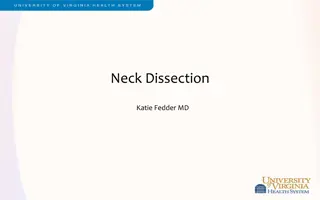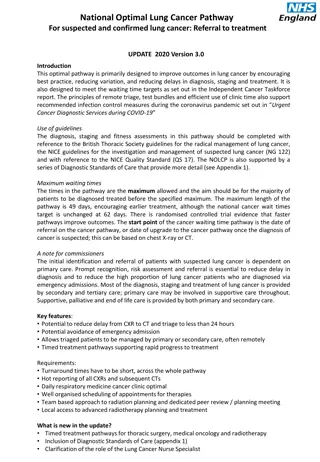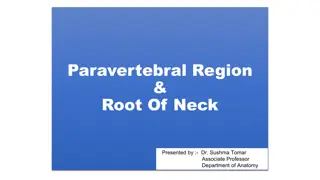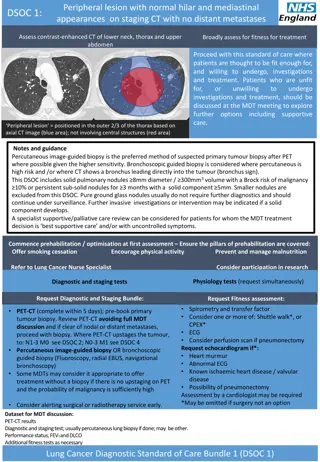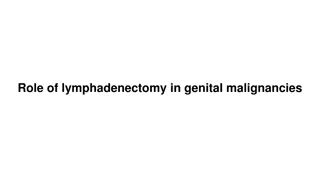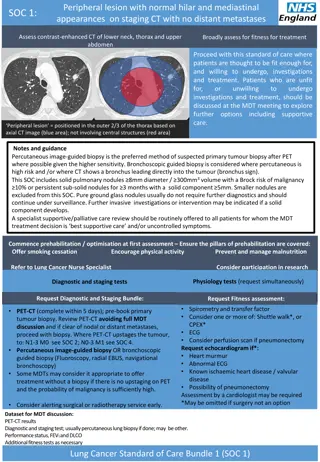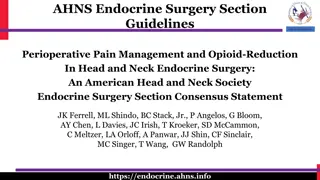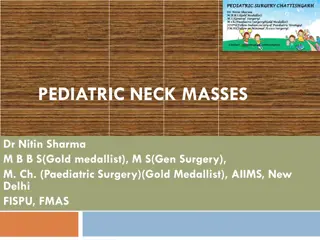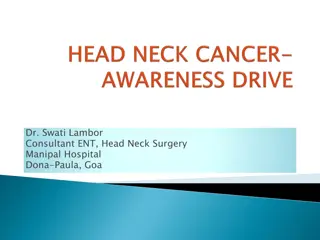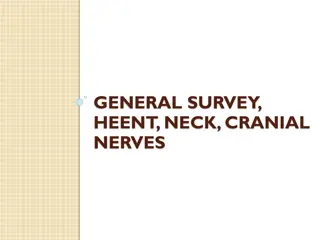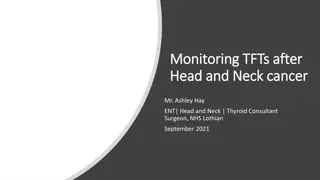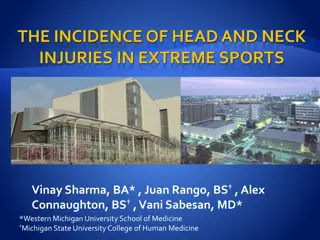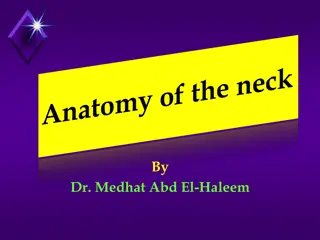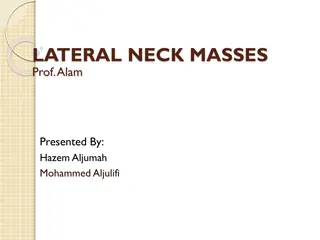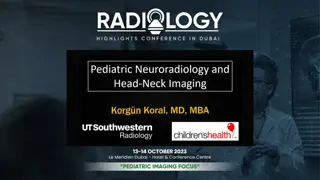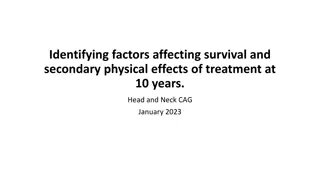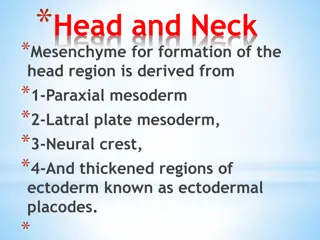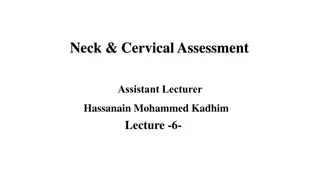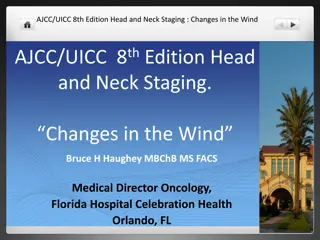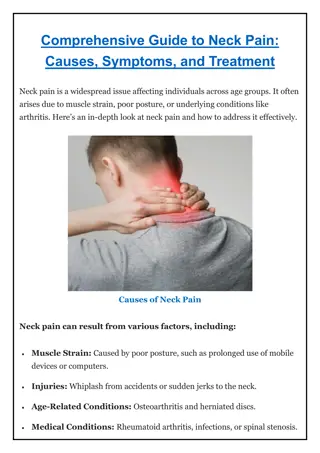Overview of Neck Dissection in Head and Neck Cancer
Neck dissection is a crucial procedure for the prognostic and therapeutic management of head and neck cancers, particularly in cases where cancer has spread to the cervical lymph nodes. This process involves removing all lymph nodes and surrounding structures in the neck region to prevent the spread
8 views • 25 slides
Do you want relief from Neck Pain in South Brisbane
Do you want relief from Neck Pain in South Brisbane? Then contact Innervate Chiro. Their dedicated practitioners combine their experience in Chiropractic, Remedial & Sports Massage for fast effective relief of Back Pain, Neck Pain, Headaches, Vertigo, Sports Injuries, shoulder, hip, nerve pain, scia
0 views • 6 slides
Understanding Neck Anatomy: Triangles, Glands, and Lymph Nodes
Explore the intricate anatomy of the neck, including the various triangles, thyroid and parotid gland structures, as well as cervical lymph nodes. Delve into the essentials of neck mass evaluation, differential diagnosis, and management strategies. Enhance your knowledge of head and neck surgery thr
0 views • 53 slides
National Optimal Lung Cancer Pathway: Referral to Treatment Update 2020 Version 3.0
This optimal pathway aims to improve outcomes in lung cancer by reducing delays in diagnosis, staging, and treatment, while meeting waiting time targets. It emphasizes remote triage, test bundles, and efficient clinic use. The pathway includes maximum waiting times, timely treatment pathways, and gu
0 views • 16 slides
Understanding Corn Growth Stages: Leaf Staging Methods and Considerations
Various leaf staging methods, including the Leaf Collar Method and Droopy Leaf Method, are used to identify corn plant growth stages. The Leaf Collar Method involves counting leaves with visible collars, while the Droopy Leaf Method considers leaves at least 40-50% exposed from the whorl. Factors li
0 views • 9 slides
Anatomy of Paravertebral Region and Root of Neck
This informative content presents the paravertebral region and the muscles of the neck, including the scalene muscles (posterior, medius, and anterior). It covers the origin, insertion, nerve supply, and actions of these muscles, providing a clear understanding of their functions. Additionally, it d
0 views • 18 slides
Understanding Grading and Staging of Malignant Tumors in Cancer Patients
Grading and staging are crucial in determining the aggressiveness and extent of malignant tumors. Grading involves assessing the level of malignancy based on cell differentiation and mitotic activity, while staging considers the size of the tumor, lymph node involvement, and presence of metastases.
7 views • 31 slides
Skin Cancer Primary Tumour Staging Changes: RCPath Updates
Explore the latest primary tumour staging changes for skin cancer, including updates from RCPath, datasets for BCC and SCC, changes in TNM classification for skin carcinomas, and upcoming new college datasets. Dive into the evolving landscape of skin cancer staging since January 2018 with detailed s
0 views • 11 slides
Anatomy of the Prevertebral Region in the Neck
The prevertebral region in the neck extends from the 1st cervical vertebra to the upper two thoracic vertebrae. It includes structures like prevertebral and paravertebral muscles, cervical plexus, sympathetic chains, and large vessels. The prevertebral muscles, including rectus capitis anterior and
0 views • 15 slides
Standard of Care for Peripheral Lesion Assessment in Lung Cancer
The provided guidelines outline the standard care pathway for assessing peripheral lesions in lung cancer patients based on staging CT findings. It includes recommendations for biopsy methods, fitness assessment, PET-CT imaging, and considerations for treatment decisions. The protocol emphasizes tai
0 views • 5 slides
Role of Lymphadenectomy in Genital Malignancies
Pelvic and paraaortic lymph node evaluation is crucial in the surgical staging of gynecological malignancies. The goals of lymph node dissection are to determine disease extent and guide further treatment. Pelvic lymph nodes include common iliac, external and internal iliac, obturator, sacral, and p
0 views • 16 slides
Standard of Care for Peripheral Lesion Assessment with Normal Hilar and Mediastinal Appearances
Assessing patients with peripheral lesion on staging CT with normal hilar and mediastinal findings. Further investigation with contrast-enhanced CT is recommended for fitness evaluation and treatment planning. Biopsy methods, diagnostic criteria, and considerations for nodules and nodal staging are
4 views • 5 slides
Understanding Cancer Staging: Purpose, Sources, and Systems
Cancer staging is crucial in assessing the extent of cancer, determining appropriate treatment, and predicting prognosis. This process involves various sources such as physical exams, radiology scans, and pathology reports. Major staging systems like SEER and AJCC help classify cancer stages. Differ
0 views • 17 slides
AHNS Endocrine Surgery Section Guidelines: Perioperative Pain Management and Opioid Reduction
The American Head and Neck Society Endocrine Surgery Section provides consensus statements on perioperative pain management and opioid reduction in head and neck endocrine surgery. Addressing the opioid addiction crisis, the expert panel offers guidelines on pain management strategies, opioid prescr
0 views • 18 slides
Pediatric Neck Masses: Causes and Anatomy Explained by Dr. Nitin Sharma
Learn about pediatric neck masses, their causes including congenital, inflammatory, and malignant factors, and the embryology and anatomy behind them. Detailed insights are provided on the branchial system, its arches, pouches, and the structures they contribute to in the neck. Dr. Nitin Sharma, a h
0 views • 42 slides
Understanding Neck Swellings and Cysts
Explore the anatomy of neck muscles, main categories of neck swellings, and different types of cysts like ranula, dermoid cyst, and thyro-glossal cyst. Learn about their characteristics, locations, and treatment options. Visual aids included.
0 views • 74 slides
Understanding Summary Staging in Cancer Cases
Staging cancer cases is a critical process to determine the extent of the disease at diagnosis. Summary staging, including SEER Summary Stage 2000, categorizes cancer spread, combining clinical and pathologic data. Learn about primary staging systems, summary staging groups, and how cancer spreads l
0 views • 41 slides
Comprehensive Overview of Head and Neck Cancer by Dr. Swati Lambor, ENT Consultant
Cancer of the head and neck region poses a significant threat, with various types of tumors affecting areas like the nasal cavity, paranasal sinuses, mouth, larynx, salivary glands, and thyroid. Dr. Swati Lambor, a skilled ENT consultant at Manipal Hospital in Goa, sheds light on the causes, progres
0 views • 72 slides
Clinical and Pathological Staging Cases in Oncology
This collection highlights clinical and pathological staging cases in oncology, covering scenarios from colon, lung, bladder, and kidney cancer. Each case presents detailed information on tumor characteristics, lymph node involvement, metastasis status, and clinical stages. Images accompany the desc
0 views • 9 slides
Comprehensive Adult and Pediatric HEENT, Neck, and Cranial Nerves Examination Guide
This comprehensive guide outlines the components of a normal HEENT, neck, and cranial nerves examination for adults and pediatric patients, including identifying abnormal findings and conducting focused exams. It covers common or concerning symptoms related to the head, eyes, ears, nose, oropharynx,
0 views • 77 slides
European Fellowship Programmes in ORL-HNS: Advancing Specialized Training in Rhinology, Head & Neck Surgery, and Otology-Neurotology
The European Fellowship Programmes in ORL-HNS aim to enhance clinical evaluation, diagnosis, and surgical skills in specialized areas such as Rhinology, Head & Neck Surgery, and Otology-Neurotology. Supported by European academies and societies, the program offers fellows exposure to a wide range of
0 views • 21 slides
Monitoring Thyroid Function After Head and Neck Cancer Treatment
This collection of images and data discusses the importance of monitoring thyroid function after head and neck cancer treatment, specifically focusing on post-treatment thyroid function tests, audits of practices in head and neck units, thyroid function post laryngectomy, and the significance of det
0 views • 11 slides
Updates on TNM-8 Staging for Urological Cancers: Insights by John Mitchard
An update by Consultant Histopathologist John Mitchard on TNM-8 staging for urological cancers, highlighting changes in RCC definitions and grading, along with minor adjustments in bladder staging. Details include revised pT3 criteria for kidney tumors, improvements in bladder M1 and T2 classificati
0 views • 14 slides
The Incidence of Head and Neck Injuries in Extreme Sports
Study on the prevalence of head and neck injuries in extreme sports, specifically focusing on concussions, a common type of brain injury. The research highlights the impact and risks associated with extreme sports activities, showcasing data on traumatic brain injuries and non-fatal incidents relate
0 views • 25 slides
Client Services Report: Pay Source 9999 County of San Diego
This report provides crucial information on services staging to Pay Source 9999 (Private Pay) in the County of San Diego. It is recommended to run this report monthly towards the end of the month to ensure correct staging. After running the report, check if services are staging correctly and make ne
0 views • 15 slides
Understanding the Triangles of the Neck
The neck is divided into various triangular areas by muscles such as the sternomastoid muscle. These triangles play important roles in anatomy, with the investing layer of deep fascia roofing them. Moreover, muscles like the omohyoid and sternomastoid have specific origins and actions in the neck re
0 views • 23 slides
Understanding Lateral Neck Masses: Anatomy, Diagnosis, and Management
Explore the anatomy and lymphatic drainage of the neck to effectively approach and differentiate various lateral neck masses. Learn about the anterior and posterior triangles of the neck, common neck mass differentials, and the significance of lymph nodes in neck pathology.
0 views • 65 slides
Clinical Audit of Dental Screening in Head and Neck Oncology Patients
This clinical audit focuses on evaluating the quality of dental screening and preventative management, including fluoride prescriptions, in head and neck oncology patients. The aim is to assess if the screenings meet best practice guidelines, with objectives related to dental screenings, OPG radiogr
0 views • 15 slides
Key Findings from 2019 National Cancer Patient Experience Survey on Head and Neck Cancer
The 2019 National Cancer Patient Experience Survey focused on inpatients and day-case adults with a cancer diagnosis, particularly in the field of head and neck cancer. The survey gathered responses from various trusts, highlighting both high and low scores in patient care and support. Noteworthy fi
0 views • 7 slides
Update on Head and Neck Cancer Research Studies in the West of England
Recent research updates on head and neck cancer studies in the West of England, including recruitment data, status of various clinical trials, and upcoming studies like PETNECK.2 and HoT. Insights into site openings, closures, and sample sizes provide a comprehensive overview of the current research
0 views • 11 slides
Pediatric Neuroradiology & Head and Neck Imaging Quiz
Explore this quiz on pediatric neuroradiology and head and neck imaging, featuring topics such as tubulinopathy, bacterial meningitis, and more. Test your knowledge with various cases and presentations. Dive into the world of pediatric imaging under the guidance of Dr. Korgn Koral, MD, MBA.
0 views • 38 slides
Why did Elasmosaurus Have Such a Long Neck?
Elasmosaurus had a long neck to stretch and catch food easily. Its neck could measure up to 13 meters, half of its total length, which could be up to 26 meters. With a length of up to 40 feet, Elasmosaurus would use its long neck to attack Pteranodon while hunting for fish. Despite some speculations
0 views • 6 slides
Study on Factors Affecting Survival and Physical Effects of Head and Neck Cancer Treatment at 10 Years
A research study aims to examine the long-term effects of treatment for head and neck cancer, focusing on survival factors and secondary physical morbidities. The study involves following up with participants over 10 years, assessing the impact of various factors on survival and further cancer prese
0 views • 9 slides
Development of Fetal Head and Neck Structures in Week 12
The fetal head and neck structures in week 12 exhibit a complex formation process involving contributions from all three embryonic layers and the neural crest. Neural crest plays a significant role in developing jaw skeletal elements, connective tissues, and tendons. The pharynx, starting at the buc
0 views • 30 slides
Development of Head and Neck Mesenchyme in Embryonic Formation
The formation of the head and neck region in embryonic development involves mesenchyme derived from paraxial mesoderm, lateral plate mesoderm, neural crest, and ectodermal placodes. Paraxial mesoderm contributes to brain case and muscle formation, while lateral plate mesoderm forms laryngeal cartila
0 views • 34 slides
Comprehensive Guide to Neck and Cervical Assessment by Hassanain Mohammed Kadhim
Learn how to inspect the neck for appearance and movement, differentiate between normal and abnormal findings, and perform palpation techniques for the trachea, thyroid gland, and cervical lymph nodes. Discover the important landmarks and characteristics to assess during a neck examination.
0 views • 13 slides
Images from Head and Neck Multi-Disciplinary Team Meeting Survey
Collection of images from the Head and Neck Clinical Advisory Group's Multi-Disciplinary Team Meeting held on September 10th, 2019. The slides showcase various aspects discussed during the meeting. Each image provides a visual insight into the topics covered, enhancing the understanding of the prese
0 views • 21 slides
AJCC/UICC 8th Edition Head and Neck Staging Changes
This content delves into the changes in staging guidelines for head and neck malignancies as per the 8th edition of the AJCC/UICC criteria. It explores the modifications in staging for oropharynx cancer, neck metastatic disease, oral cavity depth of invasion, and cutaneous malignancies. The presenta
0 views • 32 slides
Best Real Estate Staging in Dalrock
Are you looking for the Best Real Estate Staging in Dalrock? Then contact Orderly Fashion LLC. Whether you\u2019re a home owner who wants to DIY or a realtor looking for staging tips, this could be the option for you. \u2018OF\u2019 will consult, sou
0 views • 6 slides
Comprehensive Guide to Neck Pain - Hind Spine Clinic
Discover a comprehensive guide to neck pain at Hind Spine Clinic. Learn about the causes, symptoms, and effective treatments for neck pain, from posture correction to advanced therapies. Our expert team provides personalized care to help you relieve
2 views • 4 slides
